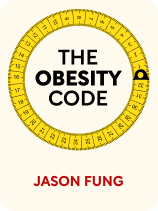

This article is an excerpt from the Shortform book guide to "The Obesity Code" by Jason Fung. Shortform has the world's best summaries and analyses of books you should be reading.
Like this article? Sign up for a free trial here .
Is obesity simply the result of eating too much and moving too little? Or is obesity a disease? What role do hormones play in obesity?
According to Canadian nephrologist Jason Fung, obesity results from a hormonal dysfunction that centers on chronically high insulin levels. Chronically high insulin throws your body’s fat storage out of balance, disrupts your hunger hormones, and drives intractable weight gain.
Keep reading to learn about Fung’s theory of obesity.
Fat Storage Depends on Your Set Weight
Fat storage, according to Fung’s theory of obesity, hinges on the interaction between insulin and your “set weight.” Simply put, normal insulin levels stimulate your body to store a fixed amount of fat, depending on how small or large you are. That default amount of fat is called your set weight, and your body constantly works to maintain it.
If you fall beneath your set weight, your body will store calories as fat in order to reach it. If you go above your set weight, your body will increase your metabolism to burn off fat and reach it. This works similarly to cruise control in a car. Set at 55 mph, you can brake or accelerate but, when left alone, the car will always return to 55 mph.
Fung explains that if your insulin levels become chronically high, your set weight increases. Returning to the car analogy, chronically high insulin levels increase the cruise control setting—locking you in at a “higher speed.” Set weight sets the amount of fat you store, so if your set weight becomes abnormally high, your body thinks that you have insufficient fat stores. To correct this, three things change:
- It decreases metabolism, lowering your body’s energy expenditure so that more food energy can become fat.
- It decreases satiety—insulin suppresses leptin, a hormone that makes you feel full, so that you struggle to feel satiated.
- It increases hunger, prompting you to eat enough to reach that higher set weight.
This effectively compels you to overeat in order to store fat until you reach the weight your body “thinks” it should be at. Thus, Fung argues, obesity isn’t caused by overeating—overeating is caused by obesity. The term “obesity” refers to the hormonal problem, and the resulting fatness is the main symptom.
Several factors contribute to the chronically high insulin levels that raise your set weight and cause obesity. They fall into two categories: what you eat, or diet composition, and when you eat, or meal timing.
1. Diet Composition—What You Eat
The first main factor that contributes to chronically high insulin levels is your diet’s composition, or what you eat. According to Fung, processed carbohydrates—specifically wheat and added sugars—contribute heavily to obesity. They cause insulin to spike sharply upward, and they promote overeating despite lacking nutritional value. Added sugars also cause fatty liver and insulin resistance, further contributing to obesity.
Additionally, Fung advises against consuming low-quality meat and dairy, such as those from industrial farming operations. Further, he explains that while not all dietary fats are problematic, trans fats and refined vegetable oils pose considerable risks.
(Shortform note: One common criticism of The Obesity Code is that when it comes to what we should eat, Fung has nothing new to say. For instance, Gary Taubes made much the same argument—that fattening carbohydrates are the main culprit of obesity—six years earlier in Why We Get Fat. In addition, Fung doesn’t clarify what constitutes low-quality meat. Consensus holds that while, for example, grain-fed and grass-fed beef have nutritional differences, both are generally healthy when eaten in moderation within a balanced diet.)
2. Meal Timing—When You Eat
The second main factor that contributes to chronically high insulin levels is meal timing, or when you eat. Fung explains that chronically high insulin doesn’t result from insulin-spiking foods alone—it also requires constant insulin stimulation. When insulin levels are both high and constant, your body’s cells become insulin resistant. That kicks off the self-perpetuating loop of chronically high insulin that drives obesity.
Constant insulin release occurs when we eat too frequently. Insulin levels increase in response to food, and they decrease between periods of eating. If you leave little or no time between periods of eating, you never allow your insulin to return to normal levels. The more frequently you eat, the faster you’ll create insulin resistance in your body.
In addition, eating constantly keeps your glucose and glycogen stores full, preventing you from burning your fat stores as fuel. Fung explains that neither snacking nor breakfast are strictly necessary.
Snacking: According to Fung, snacks have little or no nutritional value and no place in a healthy diet. Snacks are often made of refined carbohydrates, such as wheat and sugar, so they spike your insulin levels and contribute to obesity. Fung suggests that “Big Food” companies created snacks to generate more profit, and that they’ve disrupted the traditional “three square meals” eating pattern that allowed insulin to drop between meals.
Breakfast: Much like snacks, Fung contends that breakfast foods are unhealthy and contribute to obesity. Like snacks, many breakfast foods are made of cheap, processed carbs, and “Big Food” pushes the notion that “breakfast is the most important meal of the day” in order to profit from unaware consumers. Research shows that breakfast is inessential to good health, and Fung recommends skipping it or replacing carb- and sugar-heavy breakfast foods with whole, unprocessed foods such as salmon or a salad.

———End of Preview———
Like what you just read? Read the rest of the world's best book summary and analysis of Jason Fung's "The Obesity Code" at Shortform .
Here's what you'll find in our full The Obesity Code summary :
- Why everything we were taught about obesity is wrong
- The theory of obesity as a hormonal disorder that causes overeating
- Why dieting doesn’t work and exercise actually has little impact on weight loss






